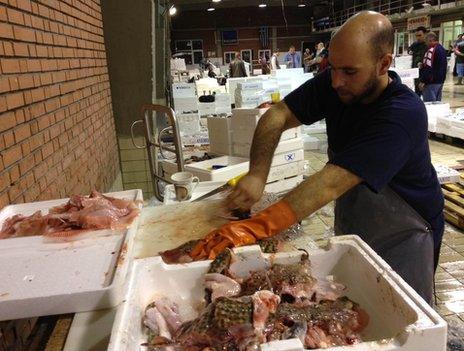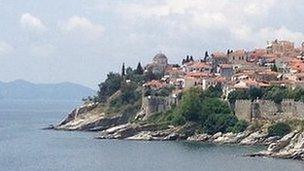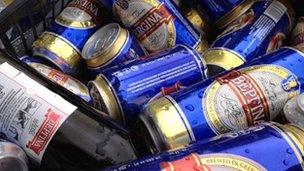Greece election: Facing 'payback time' at the polls
- Published

Kavala's fish market is seeing hard times
Dilemma, like democracy, is a Greek word. And Greeks face a choice in the 17 June parliamentary election that will be of huge and lasting consequence.
At 04:00 the fishermen bring in their catch and load it in the unseasonable, driving pre-dawn rain.
Polystyrene boxes stuffed with fresh catch are piled up across the expanse of the large, neon-lit covered fish market. Fishermen yell their prices in the briny reek of it.
But it is a buyer's market. Fishermen shake their heads as they try to offload their catch. Their prices drop lower and lower.
"Two years ago," one says to me, "all this fish would have been sold by this hour but salaries have been slashed and jobs are closing and no one has the money to buy.
"Sometimes we have to throw the fish away."
European problem

Kavala is the second-largest city in northern Greece
It is fertile electoral territory for the party of the radical left, Syriza, whose local candidate, a grey-bearded former schoolteacher called Dimitris Emmanouilides, has got out of bed early to come and harvest votes among the disaffected.
Syriza want to scrap the deep spending cuts the government in Athens has imposed in return for an EU bailout.
"We are an honourable people," he tells me. "Yes we are in debt but we always pay our debts.
"We need Europe to adopt policies that will promote growth, that will make our country productive. Unless we do that we can't meet our responsibilities.
"This is a European problem, not just a Greek one."
Syriza is taking as enormous risk with Greece's future.
For if the government that emerges after next month's elections refuses to honour the cost-cutting measures its predecessor agreed with Brussels, Greece could find itself bounced out of the eurozone.
That would mean a swift reintroduction of the Greek drachma, and, almost certainly, an instant and dramatic devaluation of the new currency.
But Syriza is finding surprising favour among Greeks who believe they have done nothing wrong and who now - as they see it - have little left to lose by standing up to Brussels and Berlin.
The head of the International Monetary Fund, Christine Lagarde, outraged many in Greece last week when she said that Greeks had been dodging tax for too long and living beyond their means.
Her point is indisputable in one sense. Successive Greek governments lied about the true extent of Greek borrowing and the size of the national deficit and debt mountain.
The country's profligacy has become a threat to the stability of the currency of all 17 member states who use it.
Life-changing crisis
The trouble for the pro-bailout, pro-Brussels parties in this election is that most Greeks blame them - the socialist Pasok and the right of centre New Democracy Party - for getting the country into the mess in the first place.
For ordinary voters do not feel as though they have been living high on the hog on other people's money.
Take Xenia Dali. She lost her job two years ago when the German-owned clothing factory that employed her relocated to Bulgaria, where labour is much cheaper.
"I have never borrowed money from anyone," she says.
"I don't owe a penny. If our politicians have borrowed money why should we the people have to pay?"
She and her family live on her husband's wages of 800 euros a month. It is enough to get by - just.
But her two teenage boys, Jordan and Costas, say they probably will not go to university now, despite doing well in school.
For them, as for many of their generation, this crisis is life-changing - strangling opportunity at the very start of their adult lives.
Xenia has always voted conservative. This time she is switching to Syriza. "I want to vote to change the entire system that has ruled this country for the last 30 years."
The option that many Greeks seem to prefer is to reject the previous government's austerity measures but to stay in the euro.
The rest of Europe is saying: "You can't do both. You have to make a choice."
'Payback time'
Greeks are being told that they have no democratic right to go on spending borrowed money - other people's money - shoring up a large and expensive public sector-heavy economy, even if that is what they choose at the ballot box.

Vergina is a rare success story in Greek business
Greek businesses dread a return to the drachma.
I went to visit a small independent brewery called Vergina. It opened in 1996, it is young, growing nicely, and beginning to develop an export market.
It is a rare private-sector success story of the sort Greece badly needs.
"If Greece gets bounced out of the euro," its owner Dimitris Politopoulos told me, "it would set the country back 30 years.
"Greeks would be plunged into poverty.
"The new drachma would instantly fall in value and things that are taken for granted now just wouldn't be available.
"We have to import our oil. That would sky rocket in price. We might need petrol rationing, exchange and capital export controls at the border.
"It's a horrible thought. But you know, we are a business so we have to make our contingency plans."
It is a decisive moment for Greece, and one that has shaken the country's most fundamental beliefs.
Greece joined the EU in the 1980s not just to pursue prosperity, but also as a way to help secure its new and still fragile democracy after years of dictatorship.
This crisis has shaken Greek faith in both.
The dilemma they face at the ballot box next month is acute and urgent.
But Greek debts are being called in at last. It is, as Christine Lagarde said, payback time.
However Greece votes, there is no easy way out.